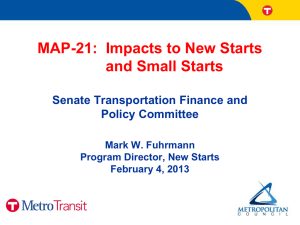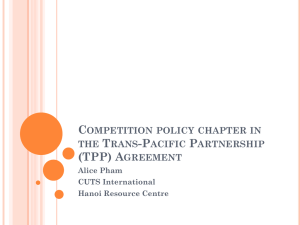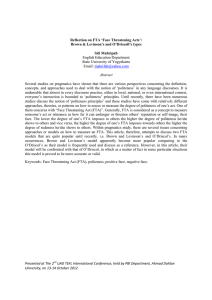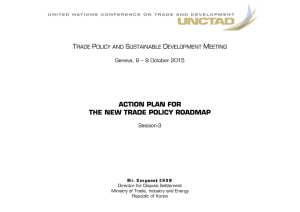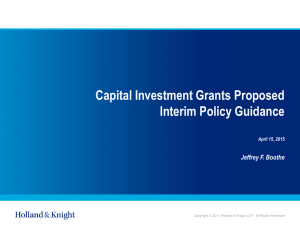FTA Section 5309 New Starts Program Evaluation Process Cambridge Systematics, Inc.
advertisement
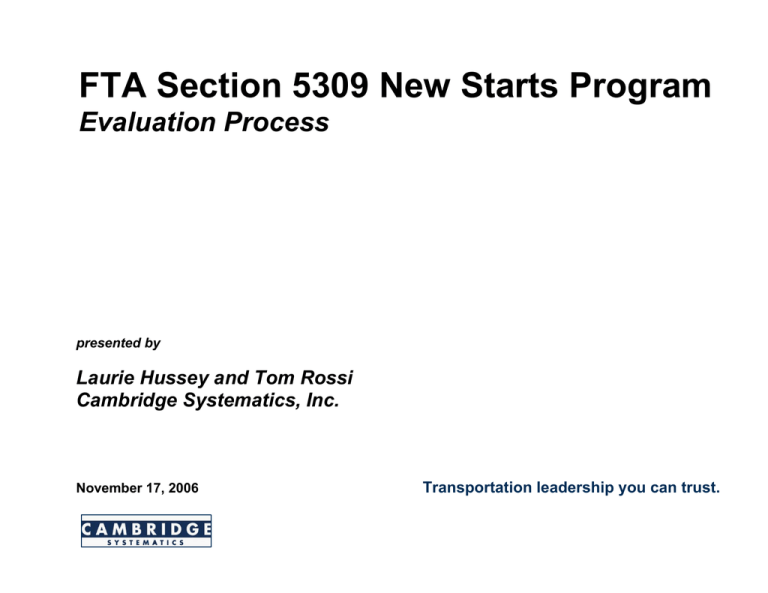
FTA Section 5309 New Starts Program Evaluation Process presented by Laurie Hussey and Tom Rossi Cambridge Systematics, Inc. November 17, 2006 Transportation leadership you can trust. What is a “New Start”? “Any fixed guide-way system which utilizes and occupies a separate right-of-way, or rail line, for the exclusive use of mass transportation and other high occupancy vehicles, or uses a fixed catenary system and a right-of-way usable by other forms of transportation” Rapid rail Light rail Commuter rail Automated guide-way transit People movers Exclusive facilities for buses (such as bus rapid transit) or other HOVs New Starts Process Overview Systems Planning Identification of Regional Travel Patterns and Priority Transportation Problems Alternatives Analysis Analysis of Costs, Benefits, and Impacts of Alternative Solution Strategies Select LPA, MPO Action, Develop Criteria, PMP Major Development Stage Decision Point Project Management Oversight FTA Decision on Entry into PE Preliminary Engineering Complete NEPA Process Refinement of Financial Plan FTA Decision on Entry into Final Design Final Design Commitment of Non-Federal Funding, Construction Plans, ROW Acquisition, Before-After Data Collection Plan, FTA Evaluation for FFGA, Begin Negotiations Construction 2 Full Funding Grant Agreement FTA New Starts Policy Discretionary Federal program New Starts caseload Criteria needed for FTA recommendations to Congress Small and Very Small Starts projects defined under SAFETEA-LU exempted 3 Evolution of FTA’s New Starts Policy 1976 – Alternatives analysis • Projects must be “cost effectiveness” • TSM alternative 1978 – Policy toward rail transit • Local financial commitment • Full funding grant agreement 1980 – Link toward EIS requirements 1984 – Policy on major investments • Ratings and cost per new rider criteria 1987 – Surface Transportation and Uniform Relocation Assistance Act • Statutory criteria – cost effectiveness and financial • Section 3(j) Report to Congress 4 Evolution of FTA’s New Starts Policy (continued) 1991 – Intermodal Surface Transportation Efficiency Act (ISTEA) • Revised justification criteria • Additional considerations • Leveled playing field for transit investments 1993 – FTA/FHWA planning regulations • Major Investment Study requirement 1994 – Executive order 12893 on infrastructure investment • Government-wide standards for investments based on costs and benefits 1994 – Policy discussion draft 1996 – Revised New Starts policy 5 • Multiple measure approach for justification • TSM as base Evolution of FTA’s New Starts Policy (continued) 1998 – Transportation Equity Act for the 21st Century (TEA-21) • Eliminated MIS requirement • Requirement for overall New Starts rating • Publication of regulations on New Starts evaluation process 2000 – Major transit capital investment projects final rule • New measure of cost effectiveness – user benefits • Baseline alternative (no longer TSM) • Before and after studies 2002 • Reduction of New Starts share to 60 percent • Additional revisions to criteria 6 Evolution of FTA’s New Starts Policy (continued) 2005 – Dear Colleague Letter 2006 • Advanced notice of proposed rulemaking, January • Procedural changes, May • Interim Small Starts Guidance, July 2007 (anticipated) – Notice of Proposed Rulemaking 7 Evaluation Criteria Project justification • Mobility improvements • Environmental benefits • Operating efficiencies • Cost effectiveness • Existing land use, transit-supportive land use policies, and future patterns Local financial commitment • Nonsection 5309 share • Capital finance plan • Operating finance plan 8 FTA Rating Process Summary Rating Project Justification Rating Financial Rating Other Factors Capital Finances Mobility Improvements Environmental Benefits Operating Efficiencies Cost Efficiencies User Benefits Low Income Households Capital Cost Employment O&M Cost Land Use Non-Section 5309 Share Operating Finances User Benefits Minimum Project Development Requirements Metropolitan Planning and Programming Requirements 9 Project Management Technical Capacity NEPA Approvals Other Considerations FTA Rating Process (continued) Summary project justification ratings and finance ratings are in turn used to determine overall project ratings to the following decision rule • High – projects must be rated at least medium-high for both finance and project justification • Medium – projects must be rated at least medium for both finance and project justification • Low – projects not rated at least medium in both finance and project justification will be rated as not recommended • Not rated – indicates that FTA has serious concerns about the information submitted for the mobility improvements and cost effectiveness criteria because the underlying assumptions used by the project sponsor may have inaccurately represented the benefits of the project • Not available – given to projects that did not submit complete data to FTA for evaluation 10 FTA Definition of User Benefits “User benefits are the changes in mobility for individual travelers that are caused by a project or policy change, measured in hours of travel time, and summed over all travelers.” 11 User Benefits are Computed from Local Mode Choice Models The use of the logit model is assumed – U1 = B0 + B11 X1 + B21X2 + … + Bn1Xn exp(U1) Prob(1) = 12 Σ exp(Uj) Mode Choice Model Variables In-vehicle time Income Wait time Auto ownership Walk access time Area type Auto access time Pedestrian environment Fare Parking cost Transfers 13 Logsum Variable Log of denominator of the logit function Logsum = ln Σ exp(Uj) Represents the composite utility of all alternatives, including all variables Increase in the utility of any alternative results in an increase in the logsum value 14 FTA User Benefits Calculation Logsum value expressed in units of time – ln Σ exp(U1) User benefits = in-veh. time coeff. 15 The FTA SUMMIT Program Computes user benefits as defined Two parts • Code added to mode choice model script to save logsum values • Post processor to save and report user benefits results Provides a variety of reports, maps, and graphics showing the magnitude and locations of user benefits 16 Example of User Benefits Output 17 SUMMIT Program Use as Diagnostic Previously unknown problems with models Problems with highway time savings Inconsistencies with other models Problems in definitions of the alternatives 18 FTA Proposed Guidelines for Models No “cliffs” in level of service variables • Maximum travel or wait times • Maximum access distances or times • Minimum times by submode Restrictions on model coefficients • Compelling evidence if Civt < -0.03 or Civt > -0.02 • Compelling evidence if using mode-specific Civt • Compelling evidence if 2.0 < Covt/Civt < 3.0 • No “bizarre” constants 19 Mobility Improvements Travel time savings • User benefit calculation expressed in time equivalent units (hours) • Produces multimodal measure of traveler utility for all users of the transportation system Number of low income households served • GIS analysis using Census data, one-half mile radius around stations Number of jobs near stations • GIS analysis using best available local data sources 20 Environmental Benefits Change in criteria pollutant and precursor emissions and greenhouse gas emissions • Annual regional VMT by vehicle classification • Local emissions factors derived from Environmental Protection Agency (EPA) MOBILE emissions model Change in regional energy consumption in the forecast year • Calculated in BTUs, using regional VMT Current regional air quality designation by EPA 21 Operating Efficiencies Change in systemwide operating cost per passenger mile • Calculated using forecast annual passenger miles and operating costs • Changes greater than 5 cents need to be explained 22 Cost Effectiveness Incremental cost divided by transportation system user benefits • Generated using SUMMIT software and annual systemwide capital and operating costs Incremental cost per incremental rider • Generated by dividing change in annual capital/operating costs by change in annual linked trips 23 Existing Land Use, Transit Supportive Land Use, and Future Patterns I. Existing Land Use a. Existing II. Transit Supportive Plans and Policies a. Growth Management b. Transit Supportive c. Supportive Corridor Policies d. Tools to Implement Land Use Policies 24 III. Performance and Impacts of Policies a. Performance of Land Use Policies b. Potential Impact of Transit Project on Regional Land Use IV. Other Land Use Considerations Exceptional examples, e.g.: • Historic • Environmental • Community preservation • Brownfields redevelopment • Designated Federal Enterprise Zone/Empowerment Community Other Factors The degree that institutions (local transportation initiatives, parking policies, etc.) are in place as assumed in the forecasts Multimodal emphasis of the locally preferred investment strategy, including the Section 5309 New Starts project as one element Environmental justice considerations and equity issues Opportunities for increased access to employment for low income persons, and welfare to work initiatives 25 Other Factors (continued) Outstanding or unique public involvement program activities, including private sector and institutional involvement Livable communities initiatives and local economic development initiatives Consideration of alternative land use development scenarios in local evaluation and decision-making for the locally preferred transit investment decision Consideration of innovative financing, procurement, and construction techniques, including design-build turnkey applications 26 Local Financial Commitment The proposed share of total project costs from sources other than the New Starts portion of Section 5309, including Federal formula and flexible funds, the local match required by Federal law, and any additional capital funding The strength of the proposed capital funding plan The ability of the sponsoring agency to fund operation and maintenance of the entire transit system as planned once the guide-way is built 27 GAO Report to Congressional Committees “FTA New Starts Program is in a period of transition” Incorporation of economic development into evaluation process Implementation of Small Starts 28 Recent Procedural Changes Overall project rating to be “low,” “medium,” or “high” replacing the previous three-point rating scale of not recommended, recommended, or highly recommended New FTA documentation review requirements during alternatives analysis • Scope of work • Problem statement, goals, and objectives • Definition of alternatives • Study assumptions and methodologies • Study results 29 Recent Procedural Changes (continued) Project must have progressed beyond the NEPA scoping phase before entering PE Final EIS must present the New Starts rating for its LPA Before- and after-study data must be prepared and reported to FTA during AA and project development Cap to be placed on FFGA New Starts funding amount at the point of approval to enter into final design 30 Projects Proposed for FFGAs and Other Funding Fiscal Year 2007 Dollars in Millions* Ratings Total Capital Cost New Starts Share of Capital Costs Project Name Location New Starts Category West Corridor LRT Denver, CO New FFGA $593.0 South Corridor I-205/Portland Mall LRT Portland, OR New FFGA Wilsonville to Beaverton Commuter Rail Washington County, OR Northwest/ Southeast LRT MOS Financial Land Use Cost Effectiveness 49% MediumHigh Medium $21.17 $557.4 60% Medium MediumHigh $15.69 New FFGA $117.3 50% Medium MediumHigh $25.26 Dallas, TX New FFGA $1,406.2 50% MediumHigh Medium $18.60 Weber County to Salt Lake City Commuter Rail Salt Lake City, UT New FFGA $611.7 80% MediumHigh Medium $22.78 Long Island Rail Road East Side Access New York, NY Pending FFGA $7,779.3 34% Medium High $18.43 LRT = Light Rail Transit MOS = Minimum Operable Segment High Medium-High 31 * The numbers included in this table are what was recommended by FTA in the New Starts annual report but the actual total capital cost and percent of New Starts share is subject to change at the time FTA executes the FFGA. Medium Medium-Low Low Source: GAO summary of information in the New Starts annual report. Projects Proposed for FFGAs and Other Funding Fiscal Year 2007 (continued) Dollars in Millions* Ratings Location New Starts Category Total Capital Cost New Starts Share of Capital Costs Financial Land Use North Shore LRT Connector Pittsburgh, PA Pending FFGA $393.0 55% Medium MediumHigh $21.89 Second Avenue Subway MOS New York, NY Other $4,947.8 26% Medium High $14.10 Norfolk, VA Other $203.7 49% Medium Medium $21.66 Northern VA Other $1,840.1 50% Medium Medium $23.63 University Link LRT Extension Seattle, WA Other $1,720.0 41% MediumHigh MediumHigh $19.93 Largo Metrorail Extension Washington D.C. Other $433.87 60% N/A N/A N/A Project Name Norfolk LRT Dulles Corridor Metrorail Project – Extension to Wiehle Avenue LRT = Light Rail Transit MOS = Minimum Operable Segment High * The numbers included in this table are what was recommended by FTA in the New Starts annual report but the actual total capital cost and percent of New Starts share is subject to change at the time FTA executes the FFGA. Medium Medium-High Medium-Low Low 32 Source: GAO summary of information in the New Starts annual report. Cost Effectiveness Web Sites FTA New Starts web site http://www.fta.dot.gov/index5221.html New Starts Criteria guidance http://www.fta.dot.gov/planning/newstarts/planningenvironment-213.html New Starts Report to Congress http://www.fta.dot.gov/planning/newstarts/planningenvironment-2618.html GAO Report Cambridge Systematics, Inc. http://www.camsys.com/ 33
